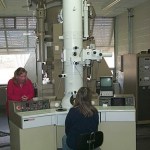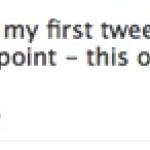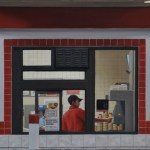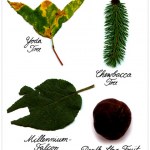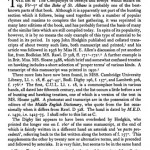
Continuing on with the ten best from half of the World's Fair, as noted earlier, this is a reprint of a post that first ran in January 2009. I had a lot of agro-food posts, many of them about Food Miles, but picked just one from that category for this list (and this one not about food miles).
In The Landscape of History, John Lewis Gaddis writes about the difference between reductionist research methods and ecological ones. Gaddis is a well-known and influential Cold War historian at Yale. This accessible and undergrad-suitable book is a brief foray into historiography and the practice of…
I'm threading the needle between eight days of Hanukkah, twelve days of Christmas, Top Ten lists, seven deadly sins, and any other enumerations with this eleven-item top ten list. So, as promised earlier, to continue on this Marlowe-esque Long Goodbye here is a reprint of a post I enjoyed writing. It first ran here in February 2007.
I mean the title in a different sense than most science bloggers or SciBlog readers will likely presume. I mean it as one who studies science, not one who practices it - given the complexity, esteem, importance, and promise of the scientific enterprise, such…
I am ending my tenure here at The World's Fair, the blog Dave and I started back in June 2006. I'll finish up and sign off for good by the end of the month. Between now and then, I'll be posting my top ten favorites from these past three years. Since you can't throw a stick without hitting someone contriving a "ten best of the decade" list here at the end of the first decade of the century, let me claim that this is the "Ten Best of the Decade from One of the Two Guys at The World's Fair."
I'll be moving on to Blogger Emeritus status. That means I still have an office but don't take…
Yesterday, I got this message:
Subject: Free TEM?
Hi David,
We have an old (functional) Philips TEM 400 electron microscope that we're going to send away for scrap metal. I'd love to keep it for student training but we don't have the space. Before we send it away as scrap metal I just thought I'd ask if you were interested in having it for the Biotech teaching lab?
Thanks!
GD
If you're wondering, the TEM 400 weighs a little over a ton, and looks a little like this:
I've jokingly tweeted about putting it in my kitchen, but in case I can't use it (which seems quite likely given its size),…
I mean that title in the positive sense of critique, like Kantian critique, intended to question so as to make better. I made note last month of a project some students here were doing, called "Is It Possible to Eat Sustainably at the University of Virginia?" This was the prompt:
Four Students set out to determine if it is possible to eat sustainably at UVA. Elizabeth will cover going vegetarian, Michael will cover going organic, Will will cover "The Six Dollar Limit", and Avik will cover going local. The conclusions of all four of us will help determine if eating sustainably is a viable…
Well, it's been about three weeks since I signed up for a personal account on twitter (you can follow me here if you're interested - my handle is @dnghub), and threw out my first "tweet."
Since then, I've found myself fully immersed in the web tool, and feel like I can say a few intelligent things about it, especially if you're reading this as someone who is resisting signing on, or someone who just wants to know a little more about it.
It might help if I first start off with a bit of context.
For instance, my lab sort of already has a twitter account, listed under @sciencescout. Here…
The Onion reports on the market-definition of technological progress. Like the new technological breakthrough that fixed the problems of the previous breakthrough, this new device promises to make everything better.
Said one customer: "Its higher price indicates to me that it is superior, and that not everyone will be able to afford it, which only makes me want to possess it more"
More below the fold.
"New Device Desirable, Old Device Undesirable"
December 3, 2009 | Issue 45â¢49
SEATTLE--With the holiday shopping season officially under way, millions of consumers proceeded to their nearest…
Lately I've been wondering if everything going on in the world of climate change has been done just for the benefit of ASIC 200, a course I co-teach which goes into the heady arena of climate politics. It's like you can't make this stuff up.
Just hot off the presses at the Guardian is news about a leaked document called "The Danish Text." It's essentially a primer document made to help speed things along at Copenhagen, but its optics also look like that of a "let's see if we can move the process out of the UN and into the hands of the more affluent countries."
The Guardian points out that:…
(hattip to Nick at terry.ubc.ca)
Coming off of Ben's recent hat tip to the paper published at PLoS ("The Progressive Increase of Food Waste in America and Its Environmental Impact"), I was reminded of some great artwork by Marc Trujillo.
I first heard of this artist by reading a nice profile of his work at a newish online literary journal called "/ONE/" (link).
Marc Trujillo is an urban landscape painter who depicts the big box retail stores, self-service gas stations, and fast-food chains that make up a large portion of the urban environment. Free of political or moral overtones, these works function both as modern…
This would be the headline from 25 years ago at Bhopal, India, when the Union Carbide plant there leaked a toxic cloud of methyl-isocyanate. My headline is indicative of the complexity of this disaster: the causes, responses, and historical path since then of regulation, cross-national legislation, and corporate attempts (or lack thereof) at responsibility to the communities where they operate are not straightforward. The company in question, Union Carbide, attempted at the time to claim it wasn't their fault (that it was sabotage). Never mind that a mere six months later, a similar…
In "A hill of beans," The Economist reports that "the average American wastes 1,400 kilocalories a day." For those who would argue for industrial solutions to our food and agricultural problems because 'how else will we feed the world?,' I would argue that we first tackle problems of waste. Over-consumption leads to the problem of waste production . . . as pointed to by the study by "Kevin Hall and his colleagues at the National Institute of Diabetes and Digestive and Kidney Diseases," as reported in the article linked above.
As someone who teaches the occasional university undergrad course, this is more real than you might think. Here an excerpt:
TELLER: Right. So, yeah, we split the plutonium atom I guess. And make a weapon out of it.
BETHE: When is this due anyway?
TELLER: I think tomorrow.
BETHE: What?!?!
TELLER: I know, right? I mean we shouldn't have put it off, but ... still sucks.
BETHE: I have another class with one of the Soviets, and he says theirs isn't due until 1949.
TELLER: 1949?!?!
BETHE: I know, right?
TELLER: I knew we took the wrong section. And no wonder the Russkies were out last night.…
Or rather, what word do you see first?
Ready?
Give your answer below...
(scroll down)
Now, mark off your answer in this poll.
This is what I see...(opinion)
Thanks for answering.
If you're wondering what this is all about, I'm just curious whether there's a particular word that crops up in people's mind the most. I'm trying to design a slide that has a humorous element and can also segue to a discussion on bias.
Note: Just added the word "HIST" to the poll as well (might take a minute to appear on the online poll). Missed that one myself - not sure if that's a reflection of a…
"Urbanites Learn the Primal Lure of Hunting"
If you hunt a meal right beyond your backyard, well, that's the fewest Food Miles you're going to find. If you're not a hunter, well, someone ought to teach you. If you're urban or, let's just say it, bourgeois, then isn't this all so fun? The New York Times reports on this new gambit for reducing food miles and its happening right here in my own backyard. "The Urban Deerslayer" reports that hunting clubs are springing up, at least here in central Virginia, at least one. A class in Charlottesville called "Deer Hunting for Locavores" will teach…
So, the other day on television, I caught a rather nice rendition of Lennon's "Imagine." It was during an episode of Glee, which is newish show that has a lot of musical theatre elements (it's a favourite of my wife's).
Anyway, this episode had a plot that focused around the highschool glee club (of which the entire show is based around) meeting a choir for the deaf. And the song in question was this really great collaboration of spoken word (from the deaf choir) and singing (from the glee club). It was quite moving really, since it nicely showcased the sentiment of Lennon's iconic song…
Just saw this at Inkling. Looks like there is a Welsh company that has taken to making paper out of feces. Their primary brand is Sheep Poo Paper and I think the logo alone is worth a visit. Click here to check it out.
Oh, and if you're in the festive mood (it is, after all, American Thanksgiving this weekend right?), you have this to look forward to:
My wife is Welsh, so now it's off to find her and make some obligatory fun of her people.
Nov 27, 2009
Dear lovers of science, badges, and various degrees of alcohol consumption
Today, I'll be scanning the comments at the Facebook group to create a few more Science Scout badges to put up sometime tomorrow, but if you've got a great idea best way is to send via my twitter account (@dnghub).
I'll also make a habit of sending this sort of request out more frequently by twitter in the future.
Thanks, (and may your repute always be exemplary and your physique above average),
Science Scout Dave Ng
All I can say is, is that this is brilliant...
And there's much more here from Christopher Niemann from the NYT Abstract City Blog. (via Magpie&Whiskeyjack)
I was listen to the radio as we were coming to the lab this morning, and one of the things that caught my ear was a quick mention of collective nouns. Now these are instances where there is a special and specific term that is coined for a group of things. Wiki describes it as follows:
In linguistics, a collective noun is a word used to define a group of objects, where "objects" can be people, animals, emotions, inanimate things, concepts, or other things. For example, in the phrase "a pride of lions," pride is a collective noun.
Then it kind of struck me that this sort of thing is most…
